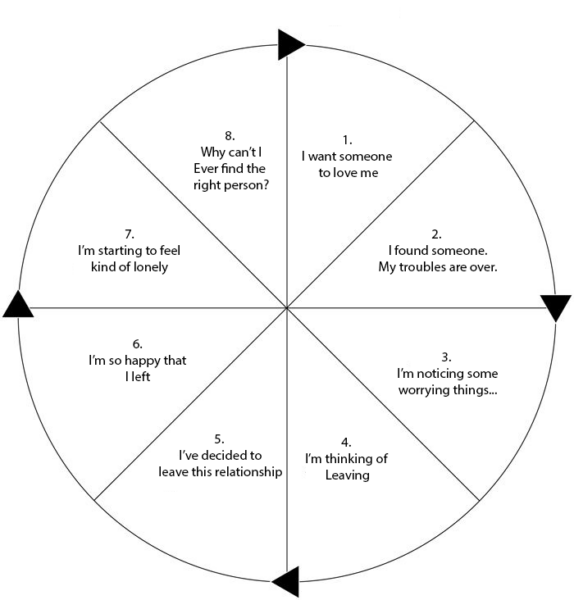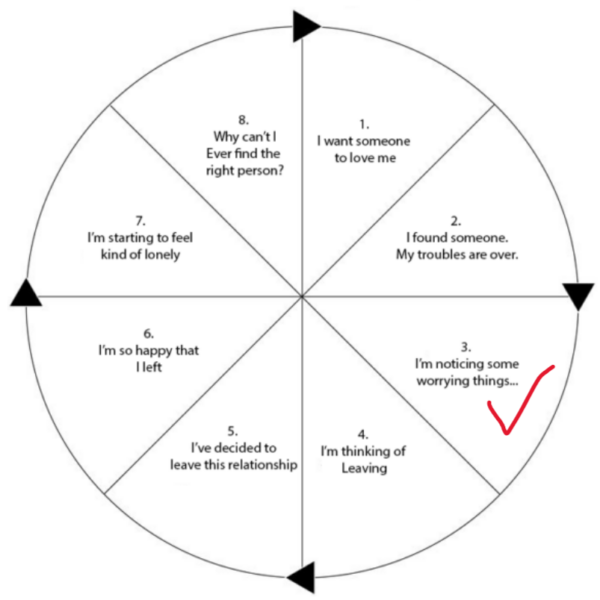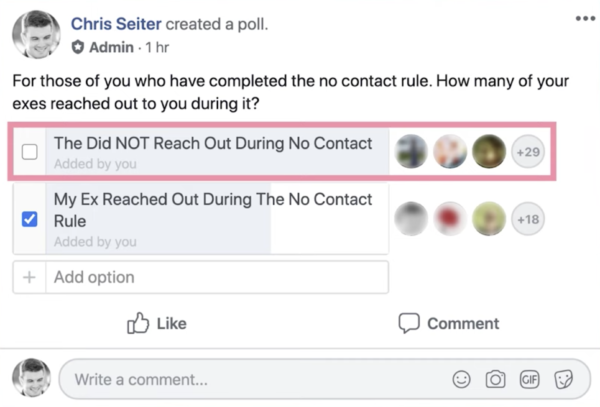This is the ultimate guide to male psychology after a breakup. In other words, we’re going to talk about all of the insights we’ve learned in the past decade that apply to men as a whole, psychologically, that you might not typically hear elsewhere.
I’m talking about ideas like,
- The Self Reliance Aspect
- The Avoidant Psyche
- Understanding Trigger Points
- Stop Expecting Them To Reach Out To You
- Differences Between Men And Women After A Breakup
Let’s dive in a bit deeper.

What Are Your Chances of Getting Your Ex Boyfriend Back?
Take the quizUnderstanding A Mans Need Of Self Reliance
In 1996, psychologist Ronald Levant started studying the ideal of masculinity. He posits that there are eight core concepts that make up the idea of masculinity,
- Emotional Restriction
- Avoidance Of Femininity
- A Focus On Toughness And Aggression
- Self Reliance
- Achievement
- Rationality
- Objectification of sleeping together
- Homophobia
Quite restrictive wouldn’t you say?
But really it’s that self reliance bit that I’d like to talk about today because it’s something that I see as a core component that keeps coming up time and time again.
You see, our internal research has consistently shown that the clients that hire us to either,
- Help them get their exes back
- Help them move on from their exes
Have avoidant exes.
This is important for our discussion because one of the most common traits of an avoidant is that they are fiercely independent.
In other words, self reliance is one of the things they pride themselves on and for the most part it’s something that everyone should have a certain amount of but where it gets men in trouble is in relationships.
Often relationships are about sharing reliance. An ideal relationship would be one where you could rely on the other person. Of course, relying on someone else requires you to be vulnerable and that’s where most men get freaked out, especially if they are avoidant.
The Male Avoidant Psyche
As stated above, most of the clients we study have male exes who are avoidant.
But what does that mean?
Someone with an avoidant attachment style usually falls victim to these three concepts,
- They struggle in moments with being vulnerable and sharing feelings
- They criticize others who are vulnerable and feel an internal shame because they themselves struggle with vulnerability
- They are very big on independent behavior and self sufficiency (big shocker here)
Avoidants are typically trying to reconcile a paradox.
I want to receive love but I don’t want to let anyone close enough to give me that love.
Their solution, they avoid.
And that brings us to breakups. What better breeding ground is there for avoidant behavior than the amount of emotion and vulnerability that goes into a breakup.
For the past few months I’ve relentlessly been throwing this graphic in my clients faces,
It’s essentially the relationship prison that most avoidants find themselves in from start to finish.

What Are Your Chances of Getting Your Ex Boyfriend Back?
Take the quizThere are eight stages to it,
- They start out seeking love
- They find you and convince themselves that there troubles are over
- Then they notice worrying things (usually this is anxious behavior or a threat of their independence)
- They contemplate leaving
- They actually leave
- They are happy they left
- They start to grow lonely
- They start to grow depressed
Which leads them right back to the beginning, wanting someone to love them.
Again and again and again the wheel rolls around, crushing everything in its path.
But really what we are interested in is this part of the graphic right here,
And this is where the concept of trigger points becomes important.
Understanding Trigger Points
If you haven’t been introduced to our coaching yet I’d like to turn your attention there for a brief moment because I have a bit of news, in a month we are going to have a new addition to our family.
Shaunna Nicol, who has been with us for the better part of five years.
Anyways, yesterday I was on the phone with her using questions in our private facebook support group to train and an interesting question flew across our desk.
It went something like this.
My ex broke up with me, he’s avoidant. I don’t understand why he doesn’t get freaked out meeting my parents but gets freaked out when I even talk about the idea of us doing things together in the future.
Side Note: I looked everywhere to find the exact post for this article but alas, it has been lost amongst the sea of posts on our facebook group.
Anyways, the reason this is relevant because it’s a direct example of the concept of trigger points.
What’s a trigger point?
Well, in this context a trigger point is anything that will trigger an exes avoidant side.
Generally speaking with avoidant men it’s any type of “threat” of their independence.
So, things like,
- Ring shopping
- Moving in together
- Becoming pregnant
- Taking a trip together
- Getting engaged
- Entering into a relationship
- You get the idea
Notice how wide the arc is of these commitment.
Simply entering into a relationship doesn’t threaten a persons independence as much as getting engaged or even a woman growing pregnant.
And therein lies the most interesting fact with regards to trigger points.
Every avoidant is different with what threatens them. In other words, there’s a different threshold.
We know from experience that one avoidant can be cool with the idea of taking a trip together for the weekend while another will get completely set off by it.
The theme is always the same though, any perceived threat to their self reliance has the potential of being a trigger point.
We Need To Stop Expecting Men To Reach Out To You First
This next bit is a late addition to this article but something that I have personally found to be a shellshock to those who aren’t familiar with it.

What Are Your Chances of Getting Your Ex Boyfriend Back?
Take the quizAs you can imagine, we are ardent fans of the no contact rule,
The no contact rule refers to a period of time where you cut off all conceivable communication with an ex after a breakup. The intent of this tactic should NOT be used to make your ex miss you but instead should be used to rebuild your own life so that you outgrow your ex. By doing this, the no contact rule can have the added benefit of making an ex miss you
Now, most of our clients expect that when they use the no contact rule on their exes that their exes are going to come beg for them back.
The mere fact that you are ignoring them will be enough to get them to reach out.
But our research has shown that isn’t the case at all.
According to a poll done by us in 2020 62% of our clients said that their exes did not reach out to them at all during no contact.
They were the ones who had to reach out first.
This makes sense as it tracks with what we know about avoidants, which most of our clients exes are.
According to Free To Attach, one of the foremost authorities on avoidant research,
But often avoidants won’t initiate contact with their exes, and they rarely unilaterally initiate reuniting because it creates uncomfortable feelings of vulnerability, and they can feel they don’t know how go about fixing things.
Yet perhaps the most interesting paradox about avoidants is that this period where they avoid you doesn’t last forever.
With enough time they start painting you as the phantom ex. They employ selective memory and start remembering the good times and forgetting the bad times.
Once again pulling from Free to Attach,
Avoidants are free to long for an ex once that person is unavailable out of the relationship, and typically out of contact so they are untouched by actual engagement and their deactivation systems aren’t triggered, revealing their long-suppressed attachment and switching their operating attachment wound from the fear of engulfment to fear of abandonment.
I talk about this concept a lot in this video,
The key here is time. You need to give a man enough time to get to this place emotionally where they think you have moved on and then they will allow themselves time to “fawn” over you from afar.
Understanding The Major Difference Between Men And Women After A Breakup
I’ve touched on this in-depth in this article but I figured it was worth repeating here,
In 2015 Binghamton University started looking at the differences between how men and women handled breakups.
They found that women tend to be more negatively affected by breakups, reporting higher levels of both physical and emotional pain. Women averaged 6.84 in terms of emotional anguish versus 6.58 in men. In terms of physical pain, women averaged 4.21 versus men’s 3.75. While breakups hit women the hardest emotionally and physically, women tend to recover more fully and come out emotionally stronger. Men, on the other hand, never fully recover — they simply move on.
Now, what does that mean that men “simply move on.”
I think it’s in reference to the fact that most men never deal with the breakup. They are happy to avoid it or simply use another person to distract themselves from the complicated feelings associated with it.
Once again, we come back to the avoidant tendencies again.

What Are Your Chances of Getting Your Ex Boyfriend Back?
Take the quizOf course, Binghamton University also found one other interesting thing in their research about men and women,
Men report more feelings of anger and engage in more self-destructive behaviors than women. Women, in comparison, frequently feel more depressed and participate in more social, affiliative behaviors than men. Women’s behaviors could be argued to be more constructive strategies as a result of their tendency to preserve the relationship, whereas men choose destructive strategies for maintaining their own self-esteem.
So, men report feelings of anger and are more prone to self destructive behaviors.
And let’s circle back around to the very first thing we talked about, Remember the masculine ideal,
- Emotional Restriction
- Avoidance Of Femininity
- A Focus On Toughness And Aggression
- Self Reliance
- Achievement
- Rationality
- Objectification of sleeping together
- Homophobia
Restricting themselves emotionally and aggression.
Yep, it seems to track.
It’s not that men don’t feel the breakup. It’s that most try to prevent themselves from feeling it because it hurts that much.
Now, just because I’m writing about it here doesn’t necessarily mean that your ex boyfriend is falling victim to this. Remember, there are exceptions to every rule but generally speaking I’ve found the stereotypes to be true when it comes to breakups.



